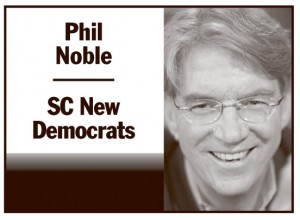Jimmy Carter — a life of simple virtue
 It was announced last week that Jimmy Carter has cancer. I don’t know what will happen or if it will cut short his life – though I’m not sure “cut short” applies to a man that is 90 years old.
It was announced last week that Jimmy Carter has cancer. I don’t know what will happen or if it will cut short his life – though I’m not sure “cut short” applies to a man that is 90 years old.
The one thing I do know is that Carter will deal with his illness just as he has lived – with courage, determination, good humor and faith.
In an era of venal politics and personal vilification as practiced by too many on both the left and right, Jimmy Carter and his character are all the more unusual and compelling. Simply put, he is a good and decent man with an abiding Christian faith who in his life and career has simply sought to do the right thing for the right reason. That reason was he simply believed it was the right thing to do.
It may sound a bit old fashioned — and it’s certainly not a term you will hear from the Acela-corridor elites who have never really liked him – but Carter has simply led a virtuous life.
First a little context. Carter was an unknown one-term governor of Georgia when he announced for president in 1974. The reaction was best captured by the leading newspaper in his home state which ran a headline the day after his announcement that proclaimed, “Jimmy Who Is Running For What!?”
Carter ran in the immediate aftermath of Watergate, when the country was fed up with lying politicians in Washington — aka Richard Nixon and his crew. Carter famously said, ‘I’ll never tell a lie,’ and it’s a sad commentary that he was maligned by many of the nation’s pundits for saying so.
Carter’s campaign was politically very savvy. He ran as an outsider and reformer and was the first presidential candidate to focus on the Iowa Caucus, which he won largely because his innate decency and peanut farmer roots resonated with voters in rural Iowa. And when he then won the New Hampshire primary and a succession of other contests, the other more well known candidates, mostly Washington politicians, began to drop out of the race one by one.
He went on to defeat Gerald Ford, the first incumbent president to be defeated since Herbert Hoover lost in 1932 during the depths of the Great Depression.
As president, Carter had his share of successes, such as the historic Israel–Egypt peace accord that he personally negotiated at Camp David and a bold new energy policy that began to wean the country off of foreign oil. He took some tough, unpopular stands that history has mostly vindicated, such as his strong advocacy of human rights, turning over the canal to Panama and the pardoning those who had evaded the Vietnam-era draft.
But in the end, Carter’s presidency was overshadowed by the taking of 52 American hostages by radicals in Iran shouting “Death to America — the great Satan.” And when a rescue effort ended in failure, it all seemed to be a metaphor for what Ronald Reagan called Carter’s failed presidency.
Upon leaving the White House, Carter created a new model of a post-presidency. He established the Carter Center to promote human rights, the spread of democracy and to tackle diseases in the developing world. The list of the Carter Center’s achievements is far too long to recount here but one notable achievement has been the virtual elimination of guinea worm disease, or river blindness, which has afflicted millions of people a year in Africa since time immemorial.
It was hard unglamorous work done away from the glare of TV cameras and celebrity activists. It was simply and quietly fighting a debilitating disease of near forgotten people – typical of the work of the Carter Center and the man himself. And, there has never been a scandal about where the Carter Center got its money nor how that money was spent.
Many have said that Carter was a better ex-president than he was a president; perhaps, but I’ll leave that to historians to decide. I do know that four U.S. presidents have received the Nobel Peace Prize but only one, Carter in 2002, has received the prize for his post-presidency activities.
I have always been attracted to Carter as a fellow Southerner and as a politician who embodied so many positive traditional Southern values. First, the politics: in 1976, he won every state of the old Confederacy except Virginia, and he carried South Carolina with more than 56 percent of the vote, ranking S.C. fourth of the 50 states with the largest Democratic majority. No other Democratic presidential candidate has even carried South Carolina since.
Carter embodied the old values of faith, family and community. Anyone who makes even the most surface examination of Carter realizes that his Christian faith is the bedrock of who he is, how he defines himself and it provides the moral compass that guides his everyday life. Even today, whenever he is back in his beloved hometown of Plains, he teaches Sunday school at the Maranatha Baptist Church.
Though some on the right seem to think they can claim a franchise on family values – Carter and his beloved wife Rosalynn have been the personification of real family values for the 70 years of their marriage. And community? Well, what can you say about someone who still lives nearly in sight of the graveyard where generations of his family are buried and can probably call by name every one of the 755 white and black souls who live in Plains?
Yes, Carter may lack the presidential success of Bill Clinton or the personal charisma of Barack Obama. But, at the end of the day, he is an honest and decent man who kept us out of foreign wars, cared for those in the world least able to care for themselves and told the truth. Few presidents of either party can claim to have done the same.
Yes, Jimmy Carter’s is a life of simple virtue.
Phil Noble is a businessman in Charleston and President of the S.C. New Democrats. He can be reached at phil@scnewdemocrats.org.




























